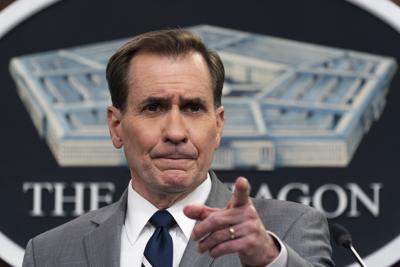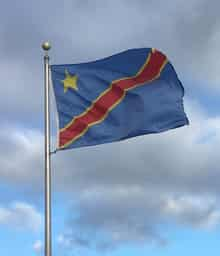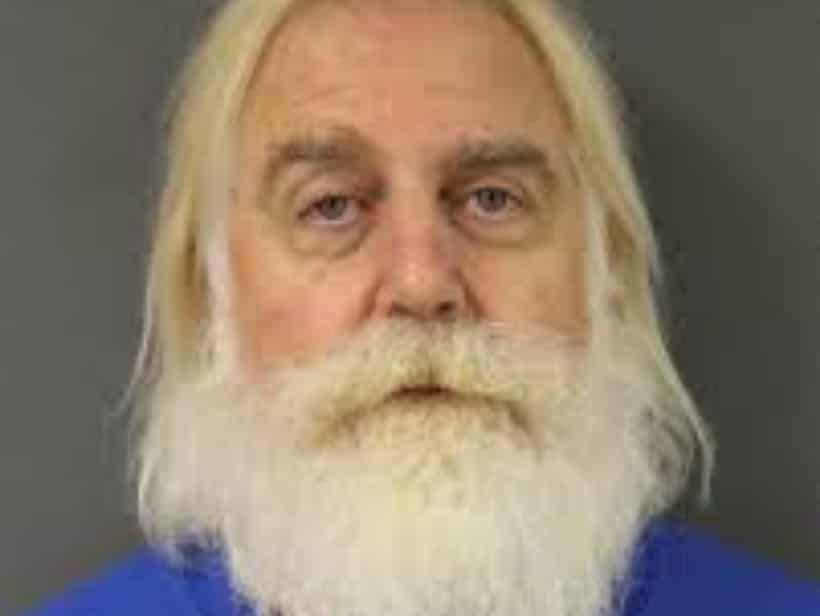Headline
US Orders 8,500 Troops On Heightened Alert Amid Russia Worry

The Pentagon ordered 8,500 troops on higher alert to potentially deploy to Europe as part of a NATO “response force” amid growing concern that Russia could soon make a military move on Ukraine. President Joe Biden consulted with key European leaders, underscoring U.S. solidarity with allies there.
Putting the U.S.-based troops on heightened alert for Europe on Monday suggested diminishing hope that Russian President Vladimir Putin will back away from what Biden himself has said looks like a threat to invade neighboring Ukraine.
At stake, beyond the future of Ukraine, is the credibility of a NATO alliance that is central to U.S. defense strategy but that Putin views as a Cold War relic and a threat to Russian security. For Biden, the crisis represents a major test of his ability to forge a united allied stance against Putin.
Pentagon press secretary John Kirby said about 8,500 U.S.-based troops are being put on alert for possible deployment — not to Ukraine but to NATO territory in Eastern Europe as part of an alliance force meant to signal a unified commitment to deter any wider Putin aggression.
Biden held an 80-minute video call with several European leaders on the Russian military buildup and potential responses to an invasion.
“I had a very, very, very good meeting — total unanimity with all the European leaders,” Biden told reporters at the White House. “We’ll talk about it later.”
The White House said the leaders emphasized their desire for a diplomatic solution to the crisis but also discussed efforts to deter further Russian aggression, “including preparations to impose massive consequences and severe economic costs on Russia for such actions as well as to reinforce security on NATO’s eastern flank.”
READ ALSO: [JUST IN] Australian Open: Rafael Nadal Beats Medvedev To Win 21st Grand Slam Title
A day earlier, the State Department had ordered the families of all American personnel at the U.S. Embassy in Kyiv to leave the country, and it said that nonessential embassy staff could leave at U.S. government expense.
Ukraine’s Foreign Ministry spokesman, Oleg Nikolenko, said that U.S. decision was “a premature step” and a sign of “excessive caution.” He said Russia was sowing panic among Ukrainians and foreigners in order to destabilize Ukraine.
Britain said it, too, was withdrawing some diplomats and dependents from its Kyiv Embassy. Prime Minister Boris Johnson said an invasion was not inevitable but “the intelligence is pretty gloomy.”
Ordering even a modest number of American troops to be ready for potential deployment to Europe is meant to demonstrate U.S. resolve to support its NATO allies, particularly those in Eastern Europe who feel threatened by Russia and worry that Putin could put them in his crosshairs.
“What this is about is reassurance to our NATO allies,” Kirby told a Pentagon news conference, adding that no troops are intended for deployment to Ukraine, which is not a member of the alliance but has been assured by Washington of continued U.S. political support and arms supplies.
The Pentagon’s move, which was done at Biden’s direction and on Defense Secretary Lloyd Austin’s recommendation, is being made in tandem with actions by other NATO member governments to bolster a defensive presence in Eastern European nations. Denmark, for example, is sending a frigate and F-16 warplanes to Lithuania; Spain is sending four fighter jets to Bulgaria and three ships to the Black Sea to join NATO naval forces, and France stands ready to send troops to Romania.
In a statement prior to Kirby’s announcement, NATO said the Netherlands plans to send two F-35 fighter aircraft to Bulgaria in April and is putting a ship and land-based units on standby for NATO’s Response Force.
NATO has not made a decision to activate the Response Force, which consists of about 40,000 troops from multiple nations. That force was enhanced in 2014 — the year Russia seized Ukraine’s Crimea Peninsula and intervened in support of pro-Russian separatists in eastern Ukraine — by creating a “spearhead force” of about 20,000 troops on extra-high alert within the larger Response Force.
If NATO does decide to activate the Response Force, the United States will contribute a range of military units, Kirby said.
“It is a NATO call to make,” Kirby said. “For our part, we wanted to make sure that we were ready in case that call should come. And that means making sure that units that would contribute to it are as ready as they can be on as short a notice as possible.”
READ ALSO: Jan. 6 Committee Requests Interview With Ivanka Trump
He said some units will be ordered to be ready to deploy on as little as five days’ notice. Among the 8,500 troops, an unspecified number could be sent to Europe for purposes other than supporting the NATO Response Force, he said. Without providing details, he said they might be deployed “if other situations develop.”
Prior to the U.S. announcement, NATO issued a statement summing up moves already described by member countries. Restating them under the NATO banner appeared aimed at showing resolve. The West is ramping up its rhetoric in the information war that has accompanied the Ukraine standoff.
Russia has massed an estimated 100,000 troops near Ukraine’s border, demanding that NATO promise it will never allow Ukraine to join and that other actions, such as stationing alliance troops in former Soviet bloc countries, be curtailed.
NATO said Monday it is bolstering its deterrence in the Baltic Sea region.
The alliance will “take all necessary measures to protect and defend all allies,” Secretary-General Jens Stoltenberg said. “We will always respond to any deterioration of our security environment, including through strengthening our collective defense.”
In Moscow, Kremlin spokesman Dmitry Peskov said it was NATO and the U.S. who were behind the escalating tensions, not Russia.
“All this is happening not because of what we, Russia, are doing. This is happening because of what NATO, the U.S. are doing,” Peskov told reporters.
The NATO announcement came as European Union foreign ministers sought to put on their own fresh display of unity in support of Ukraine, and paper over concerns about divisions on the best way to confront any Russian aggression.
In a statement, the ministers said the EU has stepped up sanction preparations, and they warned that “any further military aggression by Russia against Ukraine will have massive consequences and severe costs.”
Headline
South Korea, Japan Protest China, Russia Aircraft Incursions

South Korea and Japan reacted furiously on Wednesday after Chinese and Russian military aircraft conducted joint patrols around the two countries, with both Seoul and Tokyo scrambling jets.
South Korea said it had protested with representatives of China and Russia, while Japan said it had conveyed its “serious concerns” over national security.
According to Tokyo, two Russian Tu-95 nuclear-capable bombers on Tuesday flew from the Sea of Japan to rendezvous with two Chinese H-6 bombers in the East China Sea, then conducted a joint flight around the country.
The incident comes as Japan is locked in a dispute with China over comments Prime Minister Sanae Takaichi made about Taiwan.
READ ALSO:China Backs Nigeria, Warns Against Foreign Interference
The bombers’ joint flights were “clearly intended as a show of force against our nation, Defence Minister Shinjiro Koizumi wrote on X Wednesday.
Top government spokesman Minoru Kihara said that Tokyo had “conveyed to both China and Russia our serious concerns over our national security through diplomatic channels”.
Seoul said Tuesday the Russian and Chinese warplanes entered its air defence zone and that a complaint had been lodged with the defence attaches of both countries in the South Korean capital.
“Our military will continue to respond actively to the activities of neighbouring countries’ aircraft within the KADIZ in compliance with international law,” said Lee Kwang-suk, director general of the International Policy Bureau at Seoul’s defence ministry, referring to the Korea Air Defence Identification Zone.
READ ALSO:Trial For South Korean Woman Accused Of ‘Suitcase Murders’ Starts Today
South Korea also said it deployed “fighter jets to take tactical measures in preparation for any contingencies” in response to the Chinese and Russian incursion into the KADIZ.
The planes were spotted before they entered the air defence identification zone, defined as a broader area in which countries police aircraft for security reasons but which does not constitute their airspace.
Japan’s defence ministry also scrambled fighter jets to intercept the warplanes.
Beijing later Tuesday confirmed it had organised drills with Russia’s military according to “annual cooperation plans”.
READ ALSO:South Korean Actress Kim Sae-ron Found Dead In Seoul Apartment
Moscow also described it as a routine exercise, saying it lasted eight hours and that some foreign fighter jets followed the Russian and Chinese aircraft.
Since 2019, China and Russia have regularly flown military aircraft into South Korea’s air defence zone without prior notice, citing joint exercises.
In November last year, Seoul scrambled jets as five Chinese and six Russian military planes flew through its air defence zone.
Similar incidents occurred in June and December 2023, and in May and November 2022.
READ ALSO:Russia Insists Ukraine Must Cede Land Or Face Continued Military Push
Meanwhile, Tokyo said Monday it had scrambled jets in response to repeated takeoff and landing exercises involving fighter jets and military helicopters from China’s Liaoning aircraft carrier as it cruised in international waters near Japan.
It also summoned Beijing’s ambassador after military aircraft from the Liaoning locked radar onto Japanese jets, the latest incident in the row ignited by Takaichi’s comments backing Taiwan.
Takaichi suggested last month that Japan would intervene militarily in any Chinese attack on the self-ruled island, which Beijing claims as its own and has not ruled out seizing by force.
AFP
Headline
Thousands Reported To Have Fled DR Congo Fighting As M23 Closes On Key City

Fierce fighting rocked the eastern Democratic Republic of Congo on Tuesday as the Rwanda-backed M23 militia rapidly advanced towards the strategic city of Uvira, with tens of thousands of people fleeing over the nearby border into Burundi, sources said.
The armed group and its Rwandan allies were just a few kilometres (miles) north of Uvira, security and military sources told AFP.
The renewed violence undermined a peace agreement brokered by US President Donald Trump that Kinshasa and Kigali signed less than a week ago, on December 4.
Trump had boasted that the Rwanda-DRC conflict was one of eight he has ended since returning to power in America in January.
READ ALSO:Ambassadorial Nominees: Ndume Asks Tinubu To Withdraw List
With the new fighting, more than 30,000 people have fled the area around Uvira for Burundi in the space of a week, a UN source and a Burundian administrative source told AFP.
The Burundian source told AFP on condition of anonymity he had recorded more than 8,000 daily arrivals over the past two days, and 30,000 arrivals in one week. A source in the UN refugee agency confirmed the figure.
The Rwanda-backed M23 offensive comes nearly a year after the group seized control of Goma and Bukavu, the two largest cities in eastern DRC, a strategic region rich in natural resources and plagued by conflict for 30 years.
Local people described a state of growing panic as bombardments struck the hills above Uvira, a city of several hundred thousand residents.
“Three bombs have just exploded in the hills. It’s every man for himself,” said one resident reached by telephone.
READ ALSO:South Africa Beat DR Congo In shootout To Finish Third At AFCON
“We are all under the beds in Uvira — that’s the reality,” another resident said, while a representative of civil society who would not give their name described fighting on the city’s outskirts.
Fighting was also reported in Runingo, another small locality some 20 kilometres (12 miles) from Uvira, as the M23 and the Rwandan army closed in.
Burundi views the prospect of Uvira falling to Rwanda-backed forces as an existential threat, given that it sits across Lake Tanganyika from Burundi’s economic capital Bujumbura.
The city is the main sizeable locality in the area yet to fall to the M23 and its capture would essentially cut off the zone from DRC control.
READ ALSO:Stampede Kills 37 During Army Recruitment In Congo Capital
Burundi deployed about 10,000 soldiers to eastern DRC in October 2023 as part of a military cooperation agreement, and security sources say reinforcements have since taken that presence to around 18,000 men.
The M23 and Rwandan forces launched their Uvira offensive on December 1.
Rich in natural resources, eastern DRC has been choked by successive conflicts for around three decades.
Violence in the region intensified early this year when M23 fighters seized the key eastern city of Goma in January, followed by Bukavu, capital of South Kivu province, a few weeks later.
– Regional risk –
The peace deal meant to quell the fighting was signed last Thursday in Washington by Congolese President Felix Tshisekedi and his Rwandan counterpart Paul Kagame, with Trump — who called it a “miracle” deal — also putting his signature to it.
READ ALSO:FULL LIST: US To Review Green Cards From 19 ‘Countries Of Concern’ After Washington Shooting
The agreement includes an economic component intended to secure US supplies of critical minerals present in the region, as America seeks to challenge China’s dominance in the sector.
But even on the day of the signing, intense fighting took place in South Kivu, where Uvira is located, which included the bombing of houses and schools.
Witnesses and military sources in Uvira said that Congolese soldiers fleeing the fighting had arrived in the city overnight Monday and shops were looted at dawn.
Several hundred Congolese and Burundian soldiers had already fled to Burundi on Monday, according to military sources, since the M23 fighters embarked on their latest offensive from Kamanyola, some 70 kilometres north of Uvira.
Since the M23’s lightning offensive early this year, the front had largely stabilised over the past nine months.
Burundian President Evariste Ndayishimiye warned in February there was a danger of the conflict escalating into a broader regional war, a fear echoed by the United Nations.
Headline
‘Santa Claus’ Arrested For Possessing, Distributing Child Sexual Abuse Material

A 64-year-old man from Hamilton Township has been arrested in the United States after investigators linked him to the possession and distribution of child sexual abuse material.
The suspect, identified as Mark Paulino, had been working as a “Santa for hire” at holiday events, a role that placed him in repeated contact with children.
Mercer County officials said the investigation began on 4 December when detectives were alerted to suspicious online activity involving the uploading of child pornography from a residence in Hamilton Township. The probe quickly identified Paulino, a retired elementary school teacher, as the person involved.
READ ALSO:Nigerian Ringleader Of Nationwide Bank Fraud, Money Laundering Jailed In US, Says FBI
Police stated that Paulino had presented himself online as a retired teacher and had recently performed as Santa Claus for photographs and private, corporate, and organisational events. “Because this role involved direct, repeated contact with children, detectives worked around the clock to secure a search warrant,” authorities explained.
The warrant was executed on 5 December, during which police seized multiple items regarded as evidentiary. Paulino was taken into custody without incident and charged with possession and distribution of child sexual abuse materials, as well as endangering the welfare of a child.
Prosecutors have filed a motion to detain him pending trial. The investigation remains ongoing, and authorities have urged members of the public with relevant information to come forward.

 Headline5 days ago
Headline5 days agoJUST IN: Soldiers Announce Military Takeover Of Govt In Benin Republic

 News5 days ago
News5 days agoRufai Oseni Breaks Silence On Alleged Suspension From Arise TV

 News5 days ago
News5 days agoOAU Unveils Seven-foot Bronze Statue Of Chief Obafemi Awolowo

 Politics4 days ago
Politics4 days agoJUST IN: Tinubu Holds Closed-door Meeting With Rivers, Ebonyi Govs

 News3 days ago
News3 days agoWhy My Lineage Qualifies Me For Awujale Throne — K1 De-Ultimate

 Politics3 days ago
Politics3 days agoTinubu, Six APC Governors Hold Closed-door Meeting At Aso Villa

 News5 days ago
News5 days agoWoman Taken For Dead Wakes Up Inside Coffin Few Minutes To Her Cremation

 Politics5 days ago
Politics5 days agoAmbassadorial Nominees: Ndume Asks Tinubu To Withdraw List

 News3 days ago
News3 days agoGroup Wants Edo AG Professorship Investigated

 News4 days ago
News4 days agoHow I and Obey’s Son Escaped Getting Caught In Benin’s Coup —Dele Momodu




















